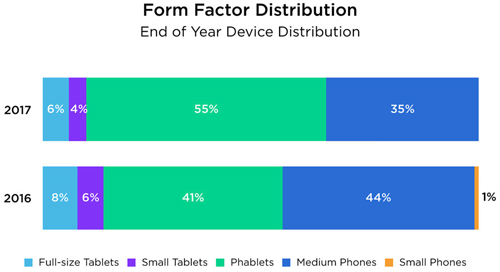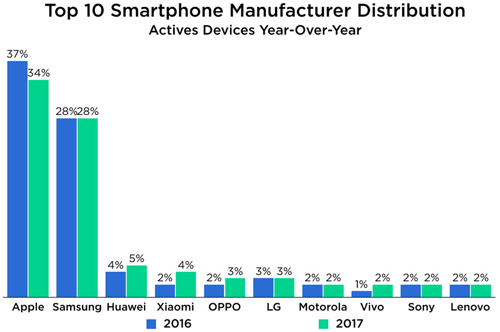News
'Phablets' Overtake Midsized Smartphones in Mobile Market Shift
- By David Ramel
- January 11, 2018
The so-called "phablet" form factor is being adopted at a faster rate than medium-sized smartphones, according to mobile analytics company Flurry.
"Understanding form factor adoption is critical for both app developers and marketers, as we know that usage differs between devices," Flurry said in its year-end report published this week.
According to Flurry, "2017 proved that there is no end in sight for phablet growth -- they represent a staggering 55 percent of active devices. As medium phone users trade in their devices, it is clear that they're opting for phablet devices, as 9 percent of the phablet growth came from medium phone adoption decline."
 Source: Flurry
Source: Flurry
In the war between Apple iOS and Google Android, Flurry also found that Apple, accounting for 34 percent of all active devices, dominated individual market share even though the fragmented Android camp (led by Samsung at 28 percent) included some two-thirds of all active devices in 2017.
 Source: Flurry
Source: Flurry
In another market shift, Flurry -- which says it's now tracking more than 1 million apps across 2.6 billion devices with its software -- found a notable slowdown in mobile app growth, marking 2017 as "the year that mobile app innovation and growth was disrupted."
Flurry was referring to the number of "sessions" it tracks, which are started when a user opens up an app. Session year-over-year growth from 2016 to 2017 was just 6 percent, compared to the 11 percent growth tracked from 2015 to 2016.
"Although session growth may have stalled, it has never been more apparent that mobile apps and smartphones have cemented their roles in users' lives," Flurry concluded. "While users, marketers and the tech industry drive towards what's next, developers have an incredibly captive audience and a platform to engage them."
About the Author
David Ramel is an editor and writer at Converge 360.